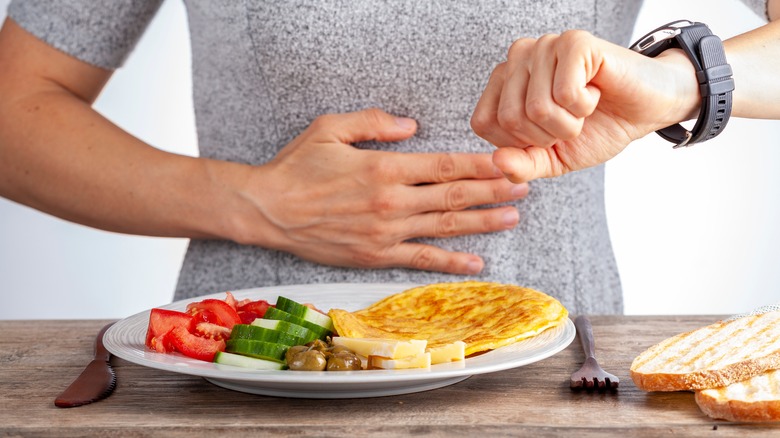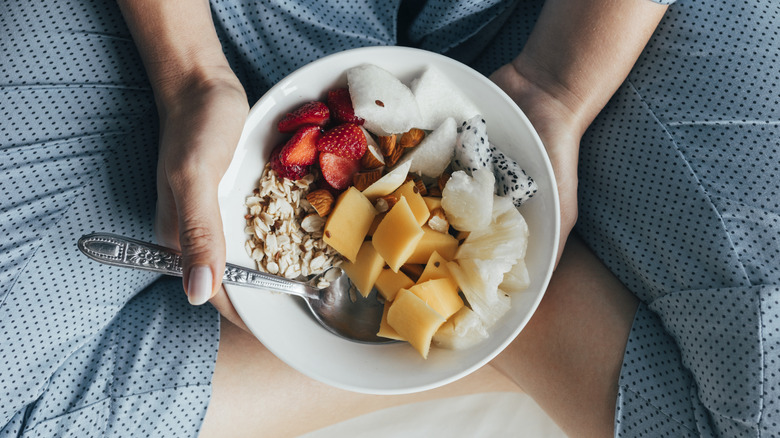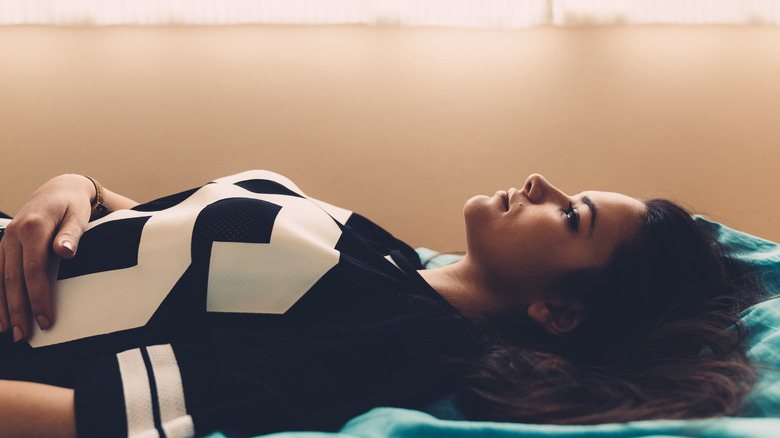Is It Safe To Fast While On Your Period? Here's What We Know
Whether you're fasting for religious reasons, for health concerns, or just to get in shape, you might be wondering if it's a good idea to continue when your time of the month rolls around. Should you be taking a break from fasting when you have your period? Is it safe to continue?
Fasting does look and feel different for those who menstruate and those who don't. However, according to the experts, it's not the week of your period that you should be concerned about if you're fasting, but the week before. Medical Director and Founder of Elemental Health Clinic, Dr. Nirusa Kumaran (via Livescience), "During a typical menstrual cycle, your estrogen levels start to decline the week before the onset of your period, if an egg is not fertilized. The decline in estrogen in the body can be stressful and cause a rise in cortisol levels."
Fasting the week prior to your menstruation will only add more stress to your body. And if you've ever experienced the pre-period slump (also known as premenstrual syndrome or PMS), you know the characteristic mood swings, headaches, tenderness in your breasts, fatigue, and bloating. For those reasons, you may want to steer clear of adding fasting-induced stressors to that list.
This doesn't mean you have to give up fasting if you really want to
Fasting the week before might pose a bigger challenge, but this doesn't mean you have to completely stop either, according to double board certified medicine doctor, Dr. Amy Shah (via Mindbodygreen).
The important thing is to listen to your body and do what feels comfortable. This might mean scaling back on the number of hours you go without food. For those doing intermittent fasting (IF) with an 18-hour fast schedule, this could look like bringing that time period down to 12, according to Shah. "Whatever you're used to, just turn it down a notch," she explained.
Fasting (and how our bodies react to it) can be extremely personal and look different from one person to another, as shared by Kumaran. "In some women, the declining estrogen may not be stress-inducing, and they may tolerate intermittent fasting ok. It is important to take a fully personalized approach, as one size does not fit all." That being said, if you are experiencing period irregularity — shorter or longer cycles than you're used to, no periods, etc. — it is important to speak with your doctor before you go on a fasting routine.
What about fasting while on your period?
When you get to the week when menstruation actually begins, there are a few simple things to keep in mind. Kumaran told Livescience that it might be wise to avoid fasting when your blood flow is heaviest. This is also to avoid adding stressors to your body.
Another thing about the first few days of your period is that your body is still recovering from the pre-period slump we talked about before, where your estrogen levels were low. Once your hormone levels start to regulate a few days into your period, you will actually feel more energetic, according to Shah (via Mindbodygreen). This is when you should ideally be fitting fasting into your schedule.
If you have an exercise regimen planned, there's no need to stop that either. The follicular phase of your menstrual cycle — which lasts from the first day of your period for about 14 days — is when estrogen predominates, according to nurse practitioner and fasting expert, Cynthia Thurlow. This is when both fasting and high-intensity exercises can be optimized. But pay attention to your nutrition, both before and during your period. Load up on vegetables rich in iron — like broccoli, spinach, sweet potatoes, string beans, and peas. It wouldn't hurt to take a magnesium supplement if you're deficient, according to Shah. Make sure you hydrate well and avoid sugary drinks. Fasting while on your period is safe as long as you listen to your body.



